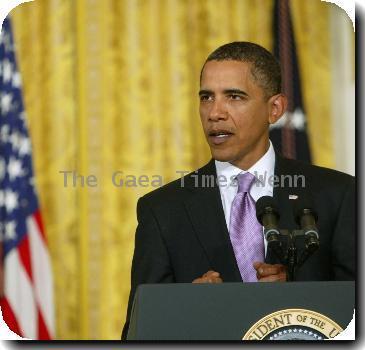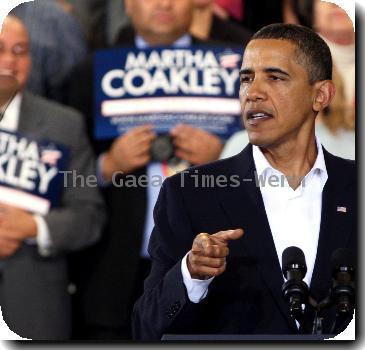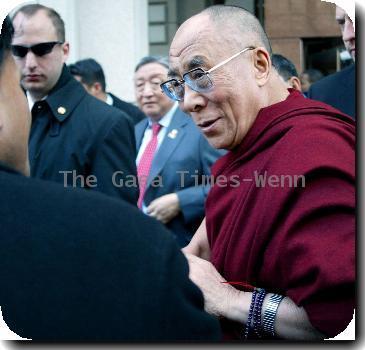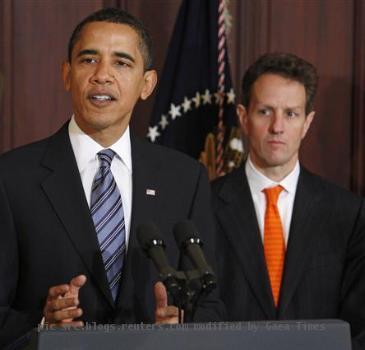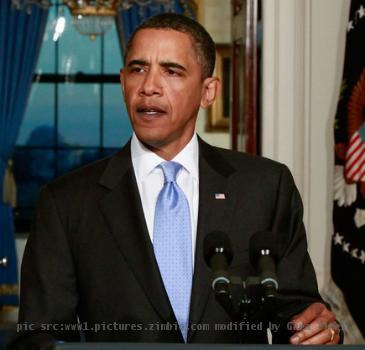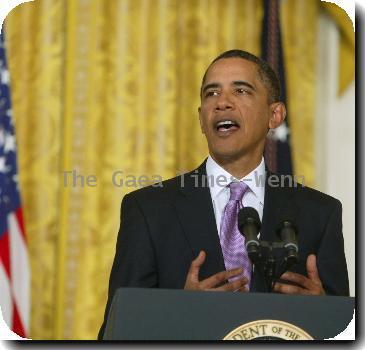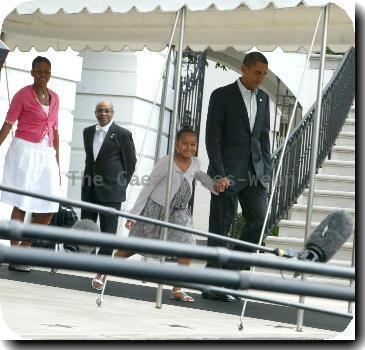Obama, Netanyahu to focus on getting Israelis, Palestinians to begin direct peace talks
By Darlene Superville, APTuesday, July 6, 2010
Obama, Netanyahu to focus on peace talks
WASHINGTON — President Barack Obama and Israeli Prime Minister Benjamin Netanyahu sought to soothe rocky relations on Tuesday, declaring that any talk of a rift is unfounded. Obama said the U.S.-Israeli bond is “unbreakable.”
“The United States is committed to Israel’s security,” Obama said as the two leaders addressed reporters in the Oval Office. “We are committed to that special bond. And we are going to do what’s required to back that up, not just with words, but with actions.”
For the Israeli leader’s part, Netanyahu said of solving years of strife with Palestinians: “We’re committed to that peace. I’m committed to that peace.” And he said that reports of the demise of the U.S.-Israel relationship are “flat wrong.”
“There’s a depth and richness of this relationship that is expressed every day,” Netanyahu said before the two leaders headed into a working lunch.
Trying to add a sense of urgency, Netanyahu said he and Obama discussed specific steps that could be taken in the coming weeks to move the peace process forward, without elaborating. “When I say the next few weeks, that’s what I mean,” he said. “The president means that too.”
Obama hailed Israel’s recent decision to greatly ease its 3-year blockade of the Gaza Strip as “real progress.” And he said he believes Netanyahu wants peace with the Palestinians and is serious about resuming the face-to-face Mideast peace talks that broke off in December 2008.
Netanyahu and Obama talked as protesters gathered across the street in Lafayette Park and chanted “No More Aid, End the Blockade,” referring to Israel’s blockade of the Gaza Strip.
After heavy international pressure, including from Obama and other top U.S. officials, Israel’s decision to ease its Gaza blockade will let in most consumer goods. The ban on exports from Gaza and limits on shipments of construction material remain.
It was the leaders’ fifth meeting, and a makeup for a scheduled June 1 session at the White House that Netanyahu canceled to deal with fallout from Israel’s deadly May 31 military raid on a flotilla trying to break the Gaza embargo.
The atmosphere — expressed in the rhetoric and in the schedule — was far different than at their chilly last meeting here. At that time, Obama, upset over Israeli policies in disputed East Jerusalem, had Netanyahu to the White House in the evening — and out of sight of all media coverage.
This time, the leaders appeared together before reporters in the Oval Office and then went into a lengthy working lunch.
A key topic was resuming the U.S.-mediated indirect peace talks. Netanyahu has repeatedly said he is ready to meet face to face with Palestinian President Mahmoud Abbas, but has given few indications about what concessions he is willing to make.
Specifically, he has rejected demands from Obama and the Palestinians for a full settlement freeze in the West Bank and East Jerusalem and a promise to resume negotiations from where they broke off under his more dovish predecessor, Ehud Olmert. The Palestinians claim the areas for a future independent state.
Palestinian negotiator Saeb Erekat said Netanyahu must choose between settlements and peace. “We want to resume direct negotiations, but the problem is that the land that is supposed to be a Palestinian state is being eaten up by settlements,” he told The Associated Press. He said the Palestinian demand that Israel halt all construction in the West Bank and East Jerusalem and resume talks where they broke off in 2008 “are not conditions, these are obligations.”
Netanyahu has imposed only a partial settlement freeze, and that is set to expire in September. The Israeli leader is under pressure from hard-liners in his coalition government to resume full-fledged construction once the freeze ends.
Obama did not answer when asked if he wanted Netanyahu to extend the freeze. Instead, he praised Israel for showing “restraint” on settlements, saying it has created more opportunity for direct talks. The president said he hoped those face-to-face talks between Israelis and Palestinians could resume before the September freeze expiration.
Obama and Netanyahu also talked about efforts to end Iran’s nuclear weapons pursuit, including sanctions that Obama signed into law last week. That legislation followed a fourth round of U.N. Security Council sanctions against Iran.
Netanyahu said the threat of a nuclear-armed Iran is the most prominent danger to peace, and called on other nations to follow the U.S. example and adopt their own unilateral sanctions on Tehran.
Associated Press writer Josef Federman in Jerusalem contributed to this story.
Tags: Barack Obama, Blockades, Foreign Policy, Gaza Strip, International Agreements, Iran, Israel, Jerusalem, Middle East, North America, Palestinian Territories, Territorial Disputes, United States, Washington, West Bank
